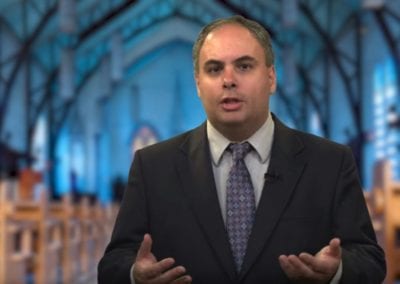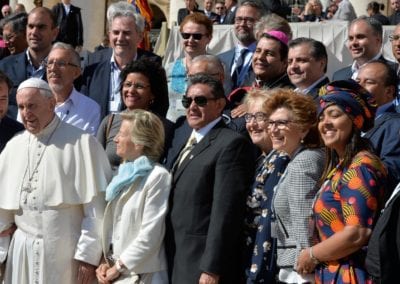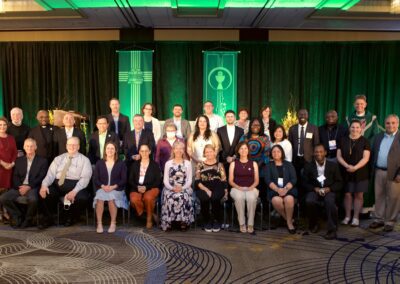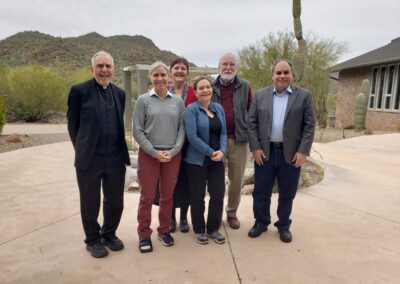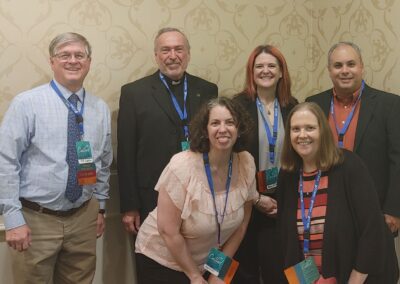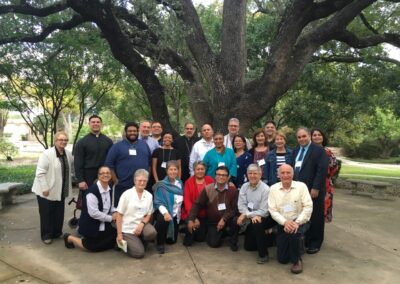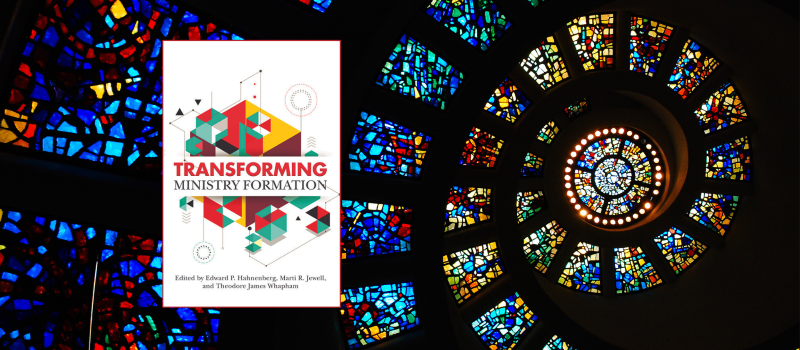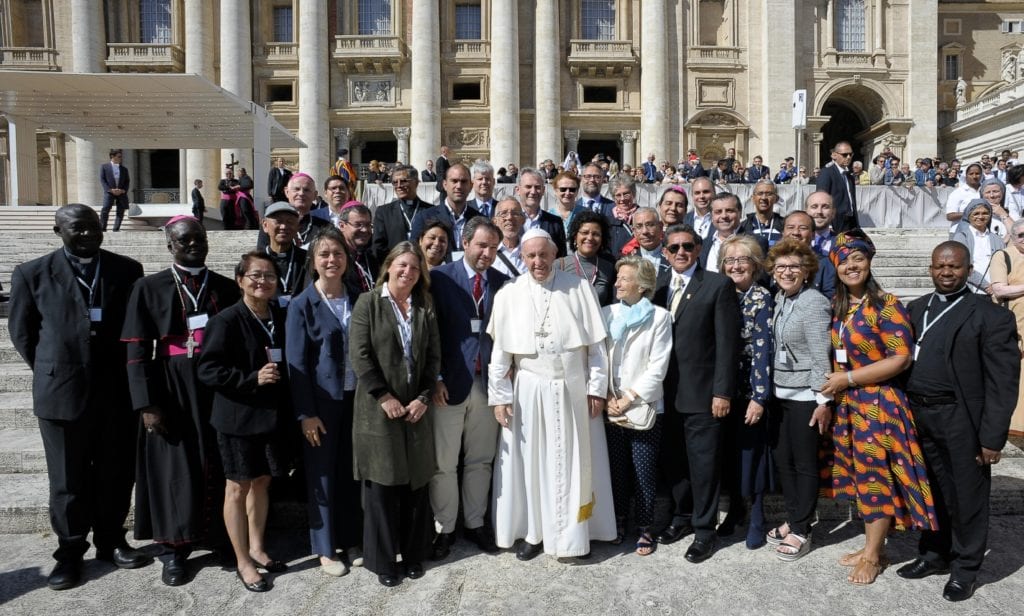Quick Links: Standards & Other Resources
Overview | Common National Lay Ministry Standards and Competencies | Catholic Prison Ministries Coalition | Catholic Campus Ministry Association | National Association of Catholic Chaplains | Archdiocese of Chicago | Archdiocese of Galveston-Houston | Diocese of San Bernardino | Consultations & Advocacy| Highlights & Reports | Video Portfolios | Ministry Formation Resources | Catholic Education | Reflections on the Word | Contact Marc
Overview
I served as Director of Certification for Ecclesial Ministry & Service at the United States Conference of Catholic Bishops (USCCB) from July 2018 through June 2023. The mandate for the office and its related subcommittee was established by the body of U.S. bishops to support efforts resourcing professional Catholic lay ministers – those members of the laity trained and prepared to assume significant leadership roles in parishes and dioceses, chaplains, campus ministers, prison ministers and more. I provided executive-level expertise and advocacy in support of Catholic lay ministry support organizations, programs for ministry preparation in dioceses and regions, and informing bishops on emerging needs and trends in Catholic ministry more broadly.
A significant aspect of my work was consulting with Catholic ministry organizations, graduate and other academic programs in ministry, as well as with national and diocesan leaders in the field, and helping to prepare professional ministry formation standards and competencies for the wide variety of ministry roles noted above. The purpose of the effort was to prepare these standards for review and approval by the bishops’ conference through the work of the Subcommittee on Certification for Ecclesial Ministry and Service, which in turn, was supported by the Committee on Catholic Education. This body consisted of 6 bishops, many of whom were representatives of collaborating committees of the USCCB, and five to six non-bishop consultants, including women and men from religious communities, lay theologians and other pastoral practice and ministry preparation experts.
The process for approval by the USCCB involved collaborating with these stakeholders – both individually and together – to assess ministry preparation needs for lay ministers in general and for particular areas. Standards and competencies were established based on documents of the universal Church and the U.S. Church, including the 2005 statement on lay ministry from the USCCB, Co-Workers in the Vineyard of the Lord: A Resource for Guiding the Development of Lay Ecclesial Ministry. Together with the subcommittee, I organized review teams chosen from among the members, provided comprehensive assesment reports to these teams and to the subcommittee, facilitated conversations between these review teams and the stakeholders, and worked together with those stakeholders to achieve final approval. Once standards were approved, I ensured good communications, collaborative engagements, promotional efforts and assessment of implementation of the standards. The standards themselves are used by Catholic academic programs focused on minister education, especially graduate programs in ministry. They are also used in some cases to support national certification processes for specialized ministry roles, such as hospital chaplains, prison ministers and campus ministers. In other contexts, the standards are a basis for long-term support for ongoing development and formation of lay ministers in national ministry organizations and dioceses. I was responsible for promotion of the approved standards to the body of bishops and to external stakeholders for such purposes.
The development of standards in preparation for those in lay ministry over the past several decades has enabled a national sharing of common “best practices” in the preparation of non-ordained lay ministers. These efforts also align with similar standards for preparation of candidates for the ordained priesthood and the role of ordained deacon. All such Catholic ministry standards are based on what are known as four comprehensive dimensions of formation – human, intellectual, spiritual and pastoral. They also include attention to ministry competencies in a culturally diverse church, with appropriate emphases on diversity, equity and inclusion.
This page presents many of the resources developed by, or in consultation with, the subcommittee and my office during my time in the role, including the standards approved by the subcommittee, annual reports and other highlights, links to promotional videos and more.
National Ministry Formation & Certification Standards
The following sets of standards were approved by the USCCB Subcommittee on Certification for Ecclesial Ministry and Service between the years of 2017 and 2022. I oversaw the development and approval process with members of the subcommittee and the multiple national organizations and diocesan programs listed. The standards are the property of the national ministry organizations and programs which produced them.
Common National Lay Ministry Standards and Competencies for Leadership Roles in Parishes and Dioceses
This set of standards was developed by the former Alliance for the Certification of Lay Ecclesial Ministers and approved in 2018. The five national Catholic ministry organizations which formed the Alliance maintain ownership and oversight of these standards. Those organizations are:
- Federation of Diocesan Liturgical Commissions (FDLC)
- National Association for Lay Ministry (NALM)
- National Association of Pastoral Musicians (NPM)
- National Community of Catechetical Leaders (NCCL)
- National Federation for Catholic Youth Ministry (NFCYM)
NALM has posted the standards on their website and the button below opens to their page in support of the standards and provides a PDF link to the latest version of the standards.
These competencies have been seen as a “gold standard” of ministry formation for many years. Envisioned as a support of national certification of lay ecclesial ministers in wide ranging parish and diocesan leadership roles, they have been used as a basis for many diocesan and academic ministry formation programs for lay people over multiple decades. The roles supported by these standards include: Parish Life Director, Pastoral Associate, parish catechetical leader, director of evangelization, parish business manager, director of worship, youth minister, pastoral juvenil, high school Catholic campus minister, director of music ministries.
I consulted with the organizations acting as the Alliance and individually in support of lay ministers, offering several presentations on the standards or related needs in lay ministry at several of the organizations’ conferences, national gatherings and virtual events.
Catholic Prison Ministries Competencies
In 2021, a first-of-its-kind set of standards comprehensively addressing lay ministry formation for volunteer and professional prison ministers was approved by the USCCB subcommittee. They have been crafted to support integral formation for Catholics who wish to minister and journey with incarcerated persons or groups, as well as those affected by incarceration in any way. The practices outlined in the competencies are based upon guidance of the 2005 USCCB Statement Co-Workers in the Vineyard of the Lord and the body of bishops’ statement from 2000, Responsibility, Rehabilitation, and Restoration: A Catholic Perspective on Crime and Criminal Justice.
The standards were submitted and are administered jointly by:
I was privileged to consult with leaders in both groups during during a three-year comprehensive process, serving as a member of the CPMC Formation Committee and Executive Team. Following approval, I worked with CPMC to promote the newly approved competencies in virtual meeting with bishops and delegates representing over 115 dioceses.
Catholic Campus Ministry Association (CCMA)
The CCMA names its mission as follows: “To be the voice and promote the mission of the Church among its students in higher education by empowering campus ministers through formation, networking and resources.”
Three distinct committees of the CCMA collaborated over a period of two years, to complete revised standards and certification procedures for Catholic college campus ministers. I was pleased to oversee the later stages and conclusion of this effort which included review and approval of these standards by the USCCB Subcommittee on Certification for Ecclesial Ministry and Service in 2019. (See a copy of the USCCB media release here.) The revision process engaged campus ministers who serve in the field and dialogue with other professional associations for lay ministers. The subcommittee’s approval of CCMA articulated the need for a high standard of pastoral practice in the college and university environment.
For further information on CCMA’s certification process, visit their website. The button below provides a copy of the CCMA handbook, which includes the approved standards.
National Association of Catholic Chaplains (NACC)
The National Association of Catholic Chaplains advocates for the profession of spiritual care and educates, certifies, and supports chaplains, clinical pastoral educators, and all members who continue the healing ministry of Jesus in the name of the Church.
In 2020-21, I consulted with NACC’s leadership to update and expand certification competencies for Catholic health care and related pastoral care ministries. In 2021, the USCCB Subcommittee on Certification for Ecclesial Ministry and Service approved those competencies, enabling NACC to certify the following ministerial roles:
- Board-Certified Catholic Chaplain
- Board-Certified Catholic Chaplain for Veterans Affairs
- Certified Associate Catholic Chaplain
- Catholic Correctional Chaplain, in association with the Catholic Prison Ministries Coalition
The USCCB subcommittee also approved Diocesan Pastoral Care Competencies for the Sick, the Homebound and Older Adults (available here on the NACC website in English and Spanish), the NACC Code of Professional Ethics, and Ethics Procedure Manual. Additionally, the subcommittee reviewed and noted the value of the Palliative Care and Hospice Advanced Certification for qualified Board-Certified Catholic Chaplains.
Here is some further information on my work with NACC’s competencies, and media releases from the USCCB on approval of the competencies. The button below provides a copy of the NACC handbook, which includes the approved competencies.
Archdiocese of Chicago
In its Fall 2022 meeting, after a year-long consultation and peer-review process which I organized and led, the USCCB Subcommittee on Certification for Ecclesial Ministry and Service approved updated ministry formation and certification standards and competencies for the Archdiocese of Chicago, as administered in collaboration with the Institute for Pastoral Leadership (IPL) at the University of Saint Mary of the Lake in Mundelein, Illinois (now part of the New School of Parish Leadership and Evangelization at the University). Dr. Linda Couri, Executive Director of the Institute, oversaw the effort at the IPL.
“The Subcommittee’s approval of the Archdiocese’s updated standards highlights the importance of support for lay ecclesial ministers who serve in leadership and coordinator roles,” said Most Reverend Gerald F. Kicanas, Bishop Emeritus of Tucson and Chairman of the Subcommittee. The Subcommittee’s review praised the IPL team for adapting to new needs in the preparation of lay ecclesial ministers for roles such as pastoral associates, directors and coordinators of religious education, and similar positions in adult faith formation and youth ministry. “The Archdiocese’s ongoing efforts, through IPL, to foster lay ministerial leadership is commendable and essential,” Kicanas added, “as are their efforts to address significant shifts in lay minister formation brought about by the COVID-19 pandemic and its impacts.”
Most Reverend Blaise Cupich, Cardinal Archbishop of Chicago, further affirmed the milestone: “I’m delighted that the USCCB Subcommittee on Certification for Ecclesial Ministry and Service has granted its approval for the Institute of Pastoral Life’s updated standards for ministry and certification. I am deeply grateful for the work IPL staff did to renew those standards in light of the realities of the church today, especially the experiences of often-marginalized ethnic and cultural groups. These efforts will help ensure ministers who are trained at IPL are well-prepared to serve the People of God for many years to come.”
Here is more information on my work with with the leadership of IPL and consultations on the competencies. The button below will show a summary of the program and the approved standards.
Archdiocese of Galveston-Houston
In 2016, the USCCB Subcommittee on Certification for Ecclesial Ministry and Service approved a set of standards in both English and Spanish for certification of parish catechetical leaders. Though prior to my time in the role, I worked with representatives from the Archdiocese over several years in support of these previously approved standards.
The button below links to the archdiocesan certification handbook, which contains the approved standards. More details are also available on their website.
Diocese of San Bernardino
In 2019, the Ministry Formation Institute (MFI) of the Diocese of San Bernardino, California, received approval of ministry standards for training and certification in various parish leadership roles from the USCCB Subcommittee on Certification for Ecclesial Ministry and Service. These roles include catechetical leadership roles, charity & justice coordinator, life & dignity coordinator, young adult ministry coordinator, pastoral associates, and liturgy coordinator. The MFI offers these preparatory classes in both English and Spanish.
I consulted with the leadership of MFI and coordinated a visit of a member of our subcommittee to assess the program. The button below provides a PDF of the certification standards approved by the subcommittee.
Consultations & Advocacy
In my years of service at the USCCB, I have engaged bishops and consultants from across the country, and from diverse cultural perspectives on the needs and developments in lay ministry. In addition to those organizations and dioceses who have developed USCCB-approved standards and competencies for lay ministry, I have been fortunate to strategize and work closely with several other Catholic dioceses and national ministry organizations and leaders: including
Featured Partners
The Association of Graduate Programs in Ministry (AGPIM) is an organization of educators, theologians and administrators representing Roman Catholic institutions that offer graduate programs in ministry. Graduate programs in ministry and pastoral theology prepare students for various areas of service to the Church including parish and family life, pastoral care, and religious education. The work of preparing ministers for these important roles is guided by the approved national ministry standards and, through the work of AGPIM, creative efforts to implement and build upon the standards and ministry formation has continued with vigor for over 30 years within these graduate programs. In a volume produced in 2021, Transforming Ministry Formation, members of AGPIM recognized the contributions of myself and several other lay ministry leaders who have provided advocacy among the body of U.S. bishops.
La Federación de Institutos Pastorales (FIP) is an organization which brings together national, regional, diocesan and local institutes engaged in the formation and enrichment of Hispanic people at all levels, in their historical and cultural context. FIP promotes an integrating vision of formation carrying out this work through a system of collaboration and interchange of experiences, leading to the creation and the development of Pastoral Institutes which respond to the diverse needs of Hispanics, developing Hispanic leadership and emphasizing their contributions to the Catholic Church and U.S. society. The formation which these institutes offer ministers is based on approved national standards for ministry formation.
Other Partners
V Encuentro | Alliance for the Certification of Lay Ecclesial Ministers | Archdiocese of Detroit | Boston College Symposium on strengthening and building upon pastoral de conjunto | Catholic Apostolate Center | Catholic Social Ministry Gathering | Diocese of Charleston, South Carolina | Diocese of Lansing, Michigan | Diocese of Stockton, California | Diocese of Syracuse, New York | Federal Bureau of Prisons, Chaplain Division | National Association of African Catholics in the U.S. | Peyton Institute for Domestic Church Life | Virtual Lay Ministry Symposium “Sustaining a Healthy Ministerial Vineyard”
Support Marc’s Work
I am happy to provide this compilation of resources at no cost. If you found this page helpful, please support me through your prayers. I also ask you to consider support to defray costs for my website and other related work.
Note: Your financial support is not tax deductible. For other ways to offer financial support besides these options, please contact me.
Highlights and Reports
In 2018, during the early week of my work at the USCCB, I was asked to participate and co-present at a first-of-its-kind meeting on best practices for forming the laity and lay ministers in Rome, in what became a precursor to the Synod process of 2022-24. Learn more and read blogs and a report from the experience. Additional links to other highlights, reports and accomplishments are below.
- 2022: Strategic Synod Feedback, Archdiocesan Standards Renewal | Office of Certification Annual Report (PDF)
- 2022: Archdiocese of Chicago Ministry Formation & Certification Standards Renewal | Summary Report (PDF)
- 2021: Office of Certification Activities Summary (PDF)
- 2021: National Catholic Hospital Chaplain & Health Care Ministries Competencies Renewal | USCCB Media Release (PDF)
- 2021: New National Catholic Prison Ministries Pastoral Care Competencies Approved | USCCB Media Release (PDF)
- 2021: Catholic Prison Ministries Video Testimonials
- 2021: Four-Year Operational Plan of the Subcommittee on Certification for Ecclesial Ministry and Service (PDF)
- 2020: Office of Certification Activities Summary (PDF, pandemic year responses)
- 2019: Catholic Campus Ministry Association Certification Standards Renewal – USCCB Media Release (PDF)
- 2019: USCCB Ministry Formation and Certification Video Series
- 2018: National Lay Ministry Formation Standards Renewal (Link to NALM website)
- 2018: Formation of the Laity: Best Practices Conference in the Vatican | Report Document (PDF)
Video Portfolios
The Value of National Common Standards of Ministry Formation
In 2019, my office organized a wide-ranging conversation about the importance of lay ministry and ministry formation with the Chairman of the USCCB Subcommittee on Certification for Ecclesial Ministry and Service, Most. Rev. Gerald Kicanas, Bishop emeritus of Tucson, several representatives from national Catholic ministry support organizations and a director of a diocesan ministry formation program Subtitles are available on each video in English, Spanish and French. View more here.
Catholic Prison Ministries Coalition Testimonials
In 2021, building on the support of the USCCB subcommittee and my office in the area of national Catholic prison ministries competencies I helped to organize, collaborate on and produce a series of testimonial videos of a bishop and Catholic lay prison ministers discussing the importance of Catholic presence in care for those in incarceration or affected by it. A representative video is included below. Subtitles are available in English, Spanish and French. View more here.
Conflict Literacy and Management Skills for Ministers (2020)
In 2020, I presented on conflict management skills for ministers in a webinar for the Catholic Apostolate Center, using materials developed by theologian Dr. Ann Garrido, author of Redeeming Conflict: 12 Habits for Christian Leaders. Those materials are also made available here with her permission.
Web Presentation: God’s Own Vintage: Co-Workers After 15 Years (2020)
My colleague Dr. Harry Dudley and I presented on developments in the area of lay ecclesial ministry in 2020 at the National Association for Lay Ministry’s 2020 virtual conference. It is presented here with the courtesy and permission of NALM.
Ministry Formation Resources
USCCB Statement on Lay Ministry
Co-Workers in the Vineyard of the Lord (2005) is a primary resource for those who are responsible for guiding the development of lay ecclesial ministry in the United States, including lay ministry formation leaders, deacons, priests, and bishops.
Colaboradores en la Viña del Señor (2005) es un recurso principal para quienes son responsables de guiar el desarrollo del ministerio eclesial laico en los Estados Unidos, especialmente para los líderes de formación del ministerio laico, diáconos, sacerdotes y obispos.
Other USCCB Resources
These additional resources produced by the USCCB can be further helpful resources in many areas of ministry.
- Professional Ministry Glossary (2020) updated by my office and approved by the USCCB Subcommittee on Certification for Ecclesial Ministry and Service
- Benefits of Ministry Formation (2017) approved by the USCCB Subcommittee on Certification for Ecclesial Ministry and Service
- National Study on Catholic Campus Ministry (2018) produced by the Office of Higher Education in the USCCB Secretariat on Catholic Education
- Procedures for Resolving Conflict (USCCB, 2002)
- Responsibility, Rehabilitation and Restoration: A Catholic Perspective on Crime and Criminal Justice (2000), a Statement of the USCCB
- Lay Ecclesial Ministry: The State of the Questions (1999) by the USCCB Subcommittee on Lay Ministry
Further Resources
- Webinar: Reclaiming Wholeness: Addiction | Recovery | Community (2022) by the Catholic Prison Ministries Coalition, featuring Joseph Cardinal Tobin and co-sponsored by the USCCB Subcommittee on Certification for Ecclesial Ministry and Service
- Pandemic Minister Resources Archive (2020), produced by my office
Catholic Education
My office was located in the USCCB Secretariat of Catholic Education and the subcommittee I worked with was part of the Committee on Catholic Education. I was able to resource and collaborate with colleagues in addressing needs related to all levels of Catholic education, particularly Catholic higher education. Such efforts included work on the certification standards with the Catholic Campus Ministry Association and follow-up from the USCCB’s 2019/2020 studies on campus ministry, engagements with the National Catholic Education Association, and discussion of formation needs for Catholic higher education mission officers.
I also worked collaboratively with the following USCCB Secretariats: Cultural Diversity in the Church | Ecumenical & Interreligious Affairs | Evangelization & Catechesis | Laity, Marriage, Family Life and Youth
Reflections on the Word
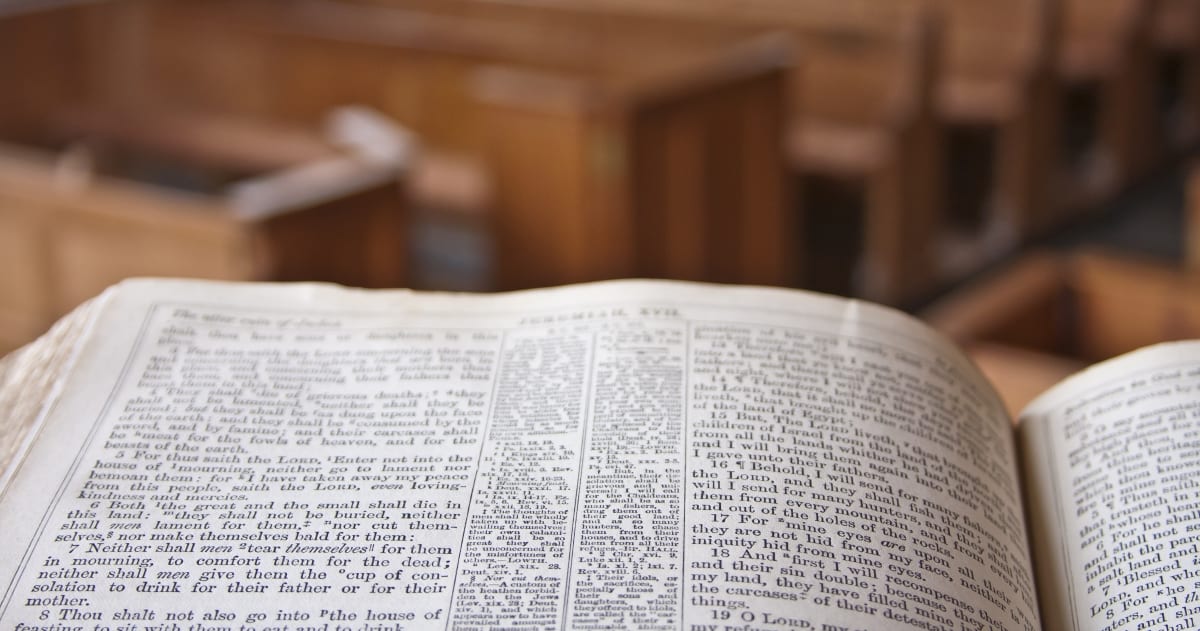
Over the course of my five years at the USCCB, I offered video reflections on the readings for the celebration of Mass, often for Saturdays or other weekdays of the liturgical year.
Contact Marc
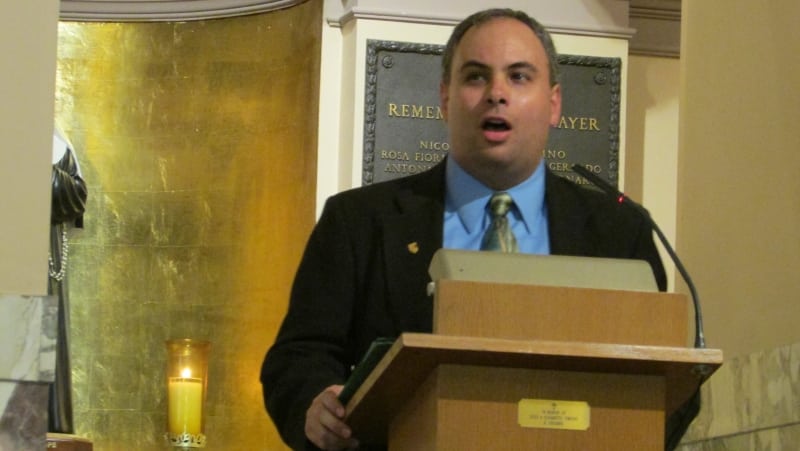
For questions or additional informations about the materials on this page, or to request Dr. DelMonico’s professional services for a liturgical, ministerial or leadership consultation, or for an academic or public presentation, please contact Marc here.

